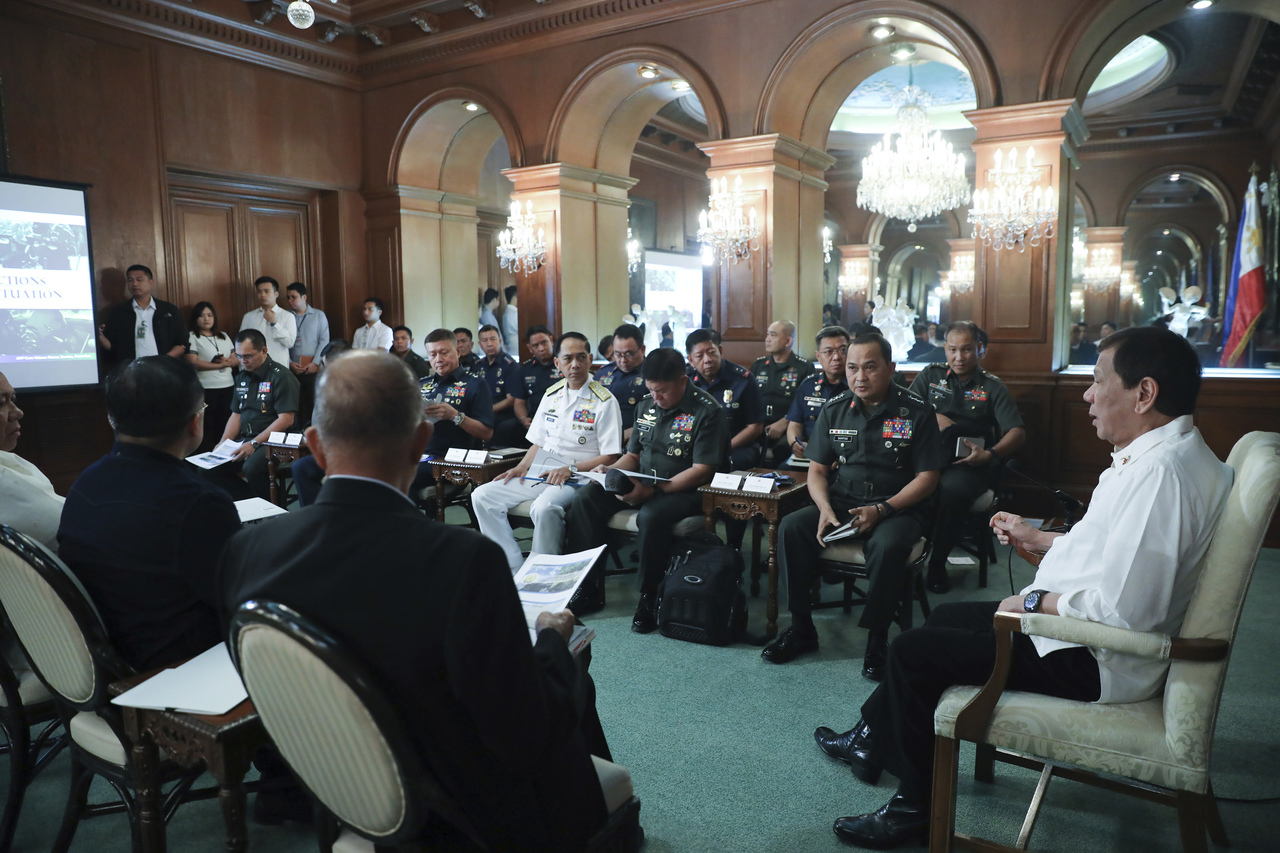Philippines orders mandatory evacuation of citizens in Iraq amid soaring US-Iran tensions
Sign up now: Get ST's newsletters delivered to your inbox

President Rodrigo Duterte (right) held an emergency meeting with his defence secretary and top military and police officials on Jan 5 to discuss the evacuation plans.
PHOTO: AP
MANILA - The Philippines has ordered the evacuation of its citizens in Iraq, as tensions between the United States and Iran escalated on Tuesday (Jan 7).
"Our marching orders were mandatory repatriation," Charge d'Affaires Jomar Sadie said in an advisory issued via Facebook Live on Wednesday.
Mr Bernard Olalia, head of the Philippine Overseas Employment Agency, later told reporters Filipinos in Iran and Lebanon had also been told to leave.
"We will go there to convince and compel Filipinos there to head back to the Philippines," he said.
He added that the government has also banned deployment of more workers to Iraq, Iran and Lebanon.
Two battalions of troops and marines would be sent to Iraq to help with the evacuation, Defence Secretary Delfin Lorenzana told reporters.
"The two battalions will not be there to engage in combat, but to facilitate or help assist in the repatriation, especially in Iraq. They will not be there to fight… but they must be able to defend themselves," he said.
Mr Sadie said all Filipinos in Iraq had been instructed to secure their exit visas from the Philippine embassy in Baghdad and plane tickets from their employers.
There are at least 2,190 Filipino workers and their dependants in Iraq, including many who work in US and other foreign facilities and commercial establishments in Baghdad. Some 3,000 more are believed to be there illegally.
More than 30,000 Filipinos are in Lebanon, while less than 1,200 are in Iran.
Labour Secretary Silvestre Bello said the government has banned the deployment of more workers to Iraq, Iran and Lebanon.
President Rodrigo Duterte this week ordered the military to prepare to deploy its aircraft and ships "at any moment's notice" to evacuate thousands of Filipino workers in Iraq and Iran should violence break out.
He expressed fears that the Philippines may have to carry out massive evacuations if violence hits Middle Eastern countries like Saudi Arabia that host large numbers of Filipino workers.
Mr Duterte held an emergency meeting with his defence secretary and top military and police officials on Sunday to discuss the evacuation plans.
"I'm nervous. Iran seems to be hell-bent on a retaliation, which I think will come. It's a matter of time… The cry for blood is there," he said in a speech.
Iran fired more than a dozen ballistic missiles at two military bases in Iraq where American troops are based in what Iranian officials said were the start of a promised retaliation for the killing of Iranian General Qassem Soleimani in Baghdad.
There were no immediate reports of casualties from the attacks in the the early hours of Wednesday, and the Pentagon said that it was still assessing the damage.
Mr Lorenzana said earlier on Tuesday that the military was ready to send three transport planes and two ships to ferry those in Iraq and Iran who would not be able to arrange their own transportation back to the Philippines.
He said the government was also considering chartering cruise ships and commercial planes to help.
"These ships can carry 3,400 to 4,000 people. So, we'll just need two ships to evacuate everyone in Iraq and Iran," he said.
But not all Filipinos in Iraq and Iran are willing to leave, he said.
He anticipated a situation similar to what happened in Libya after the death of dictator Muammar Gaddafi in 2011.
"When the Libyans found out that their Filipino employees were trying to go home, they doubled their pay," he said.
He also said that many Filipinos in Iran were already married to Iranians.
"They would not want to leave," he said.
Military chief of staff Lieutenant-General Felimon Santos Jr said Philippine forces had identified possible evacuation routes not only in Iraq and Iran but also other hot spots, like Israel.
"There are probabilities like that, and we are improving our plans just to cover everything just in case something happens," Lt-Gen Santos told reporters.
The workers in Iran and Iraq are a small fraction of the hundreds of thousands of Filipinos employed in the Persian Gulf.
The Philippines is a leading source of labour worldwide, with about a tenth of its more than 100 million people working overseas mostly as household help, construction workers, seamen and professionals.


